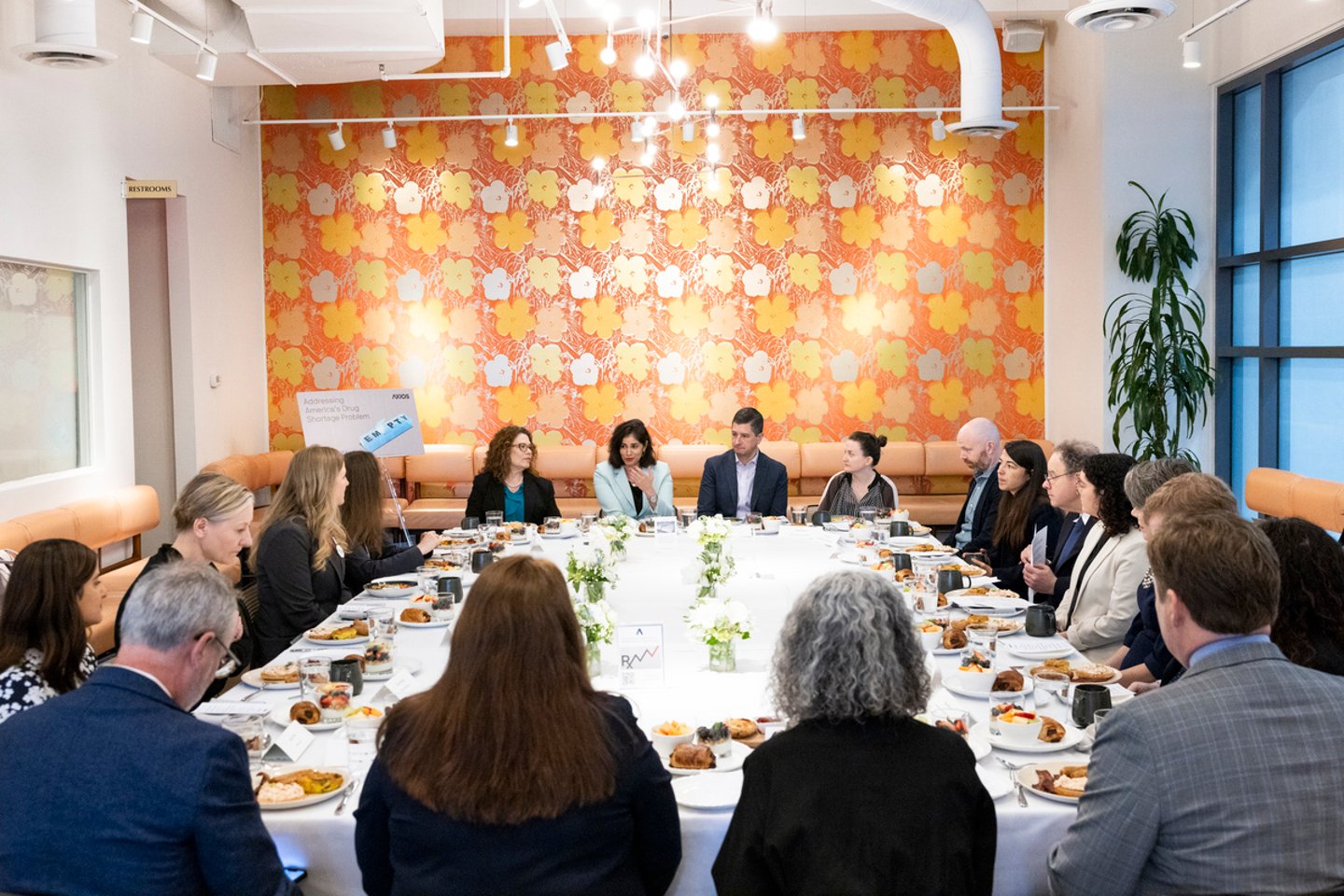Sandoz convenes stakeholders to discuss generic drug sustainability
On May 9, Sandoz partnered with Axios to host an Expert Voices Roundtable where advocates, policy influencers and healthcare leaders discussed the path forward for timely, cost-effective economic and policy solutions to ease drug shortages and improve patient access to generics.
Sandoz pointed out that despite a 40-year legacy that began with the passing of the Hatch-Waxman Act in 1984 and has led to the widespread use of generic medicines in the United States, the market is increasingly challenged by pricing pressures, questions about manufacturing quality and supply issues “that have led to crippling drug shortages we face today.”
The conversation explored the root causes of these drug shortages in the United States and discussed the multi-stakeholder efforts that must be considered to support a sustainable generics market. According to a recent report from the American Society for Health-System Pharmacists, the active drug shortages in the United States are the worst they’ve been since 2014 and impact availability of critical medicines for countless Americans, Sandoz said.
Challenges continue, but generics companies see a bright future with biosimilars
“We want to make sure patients get the medicines they need, when they need [them]," said Keren Haruvi, president of Sandoz North America. "At the end of the day, we are here to talk about a very complex solution to a very big problem that we need to solve – I don’t see a world where we don’t solve it.”
“The backdrop for this important discussion centers around the critical role that generics play in today’s healthcare landscape: Generic drugs account for nearly 90% of prescriptions filled in the United States and have generated nearly $2.9 trillion in consumer and health system savings in the past 10 years," Sandoz said. "Yet, today’s generic market has grown unsustainable due to deflated pricing, consolidated purchasers and poor federal policies that treat generics like brand medicines.”
Roundtable attendees agreed that without immediate action, the U.S. healthcare system could face a reality where drug shortages for critical, acute and chronic conditions are increasingly common.
[Read more: Senate committee moves FDA User Fee bill with 5 NACDS-backed provisions]
On addressing unsustainable pricing practices and existing policy challenges, Marta Wosińska, Senior Fellow at the Center on Health Policy at Brookings Institute, said, “We’re paying too much for some drugs and not enough for others. There is no free lunch. If we want to have resilience [and] reliability in the supply chain, we will have to pay for it."
Patient advocate and Founder of Angels for Change Laura Bray built upon this, highlighting the significance of what is on the line: “In the end we have to make sure [medicines] get to the patients. We need to make sure that manufacturing is sustainable, but that it's purchased and delivered. Both the supply and demand side have to be part of [any solution].”
It is widely acknowledged that one of the root causes of drug shortages is the unsustainably low cost of generic medicines, Sandoz noted, adding, “This, coupled with concentrated purchasing power and consolidation, puts extreme pressure on the marketplace. During the last five years, despite patients using more generics, the total value of all generic sales fell by $6.4 billion due to razor-thin margins.”
[Read more: Avalere analysis examines Medicare Part D’s plan tier placement of generics]
“Here we are at a moment where there are a set of actors that have too much market power, and they have driven the price for these products too low," said Christen Linke Young, deputy assistant to the president for Health and Veterans Affairs on the Domestic Policy Council. "We need a set of policy solutions that correct that, that ratchet back the market power that sits in the middle of the supply chain, that gives the producers at the end of the supply chain the market power that they need to demand sustainable prices that enable resilient producing."
“In addition to the market forces at play, revisiting and repealing misguided policies, like the Medicaid Generics Penalty, will be crucial to level the playing field between generic and brand-name manufacturers,” Sandoz said.
“We have Medicaid inflation penalties that are imposed on manufacturers even when they do not take a price increase. That is nonsensical,” said Craig Burton, senior vice president of policy and strategic alliances for the Association for Accessible Medicines.
Addressing many of the structural challenges facing the marketplace will require reimagining the economic framework that defines today’s generics market. “When we think about putting more money into the system, it is recognizing that the social harm of a shortage is greater than the cost,” said Alex Brill of the American Enterprise Institute.
At the same time, we must be strategic with future investments. “We need to be thinking about full supply chains. We need to prioritize supply chains, thinking about them holistically, figuring out where to invest, because otherwise we might spend a lot of money and get very little for it,” Wosińska said.
Lastly, Sandoz said, “As millions of lives and livelihoods hang in the balance, charting a path to a sustainable US generics marketplace has never been more important. This conversation was an important step to ensuring patients can get the medicines they need, when they need them. But there is more work to be done. By prioritizing generic market sustainability, we can make our health system more accessible and resilient. And most importantly, we will help patients who rely on these medicines to live longer, healthier lives.”
[Read more: Avalere analysis examines Medicare Part D’s plan tier placement of generics]


